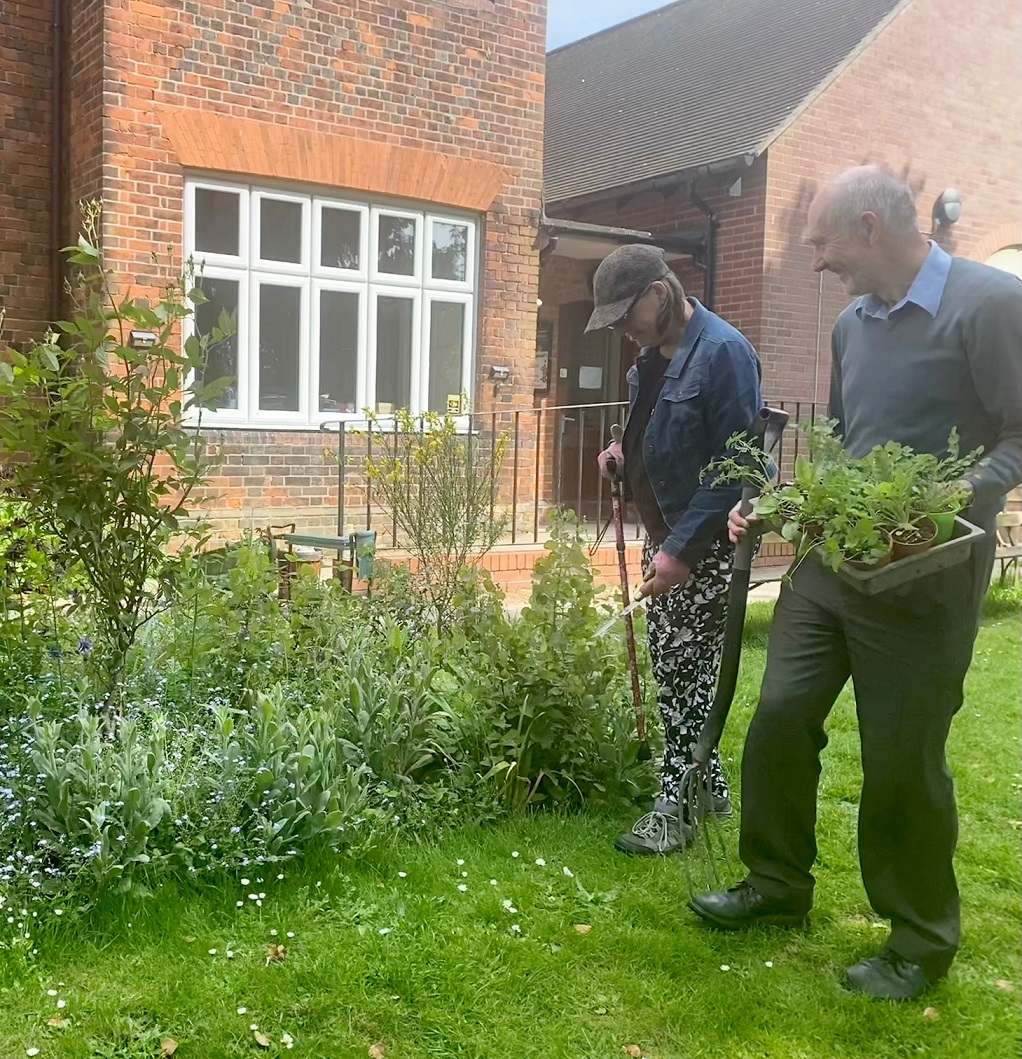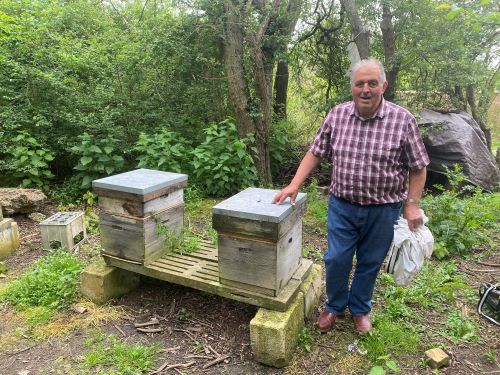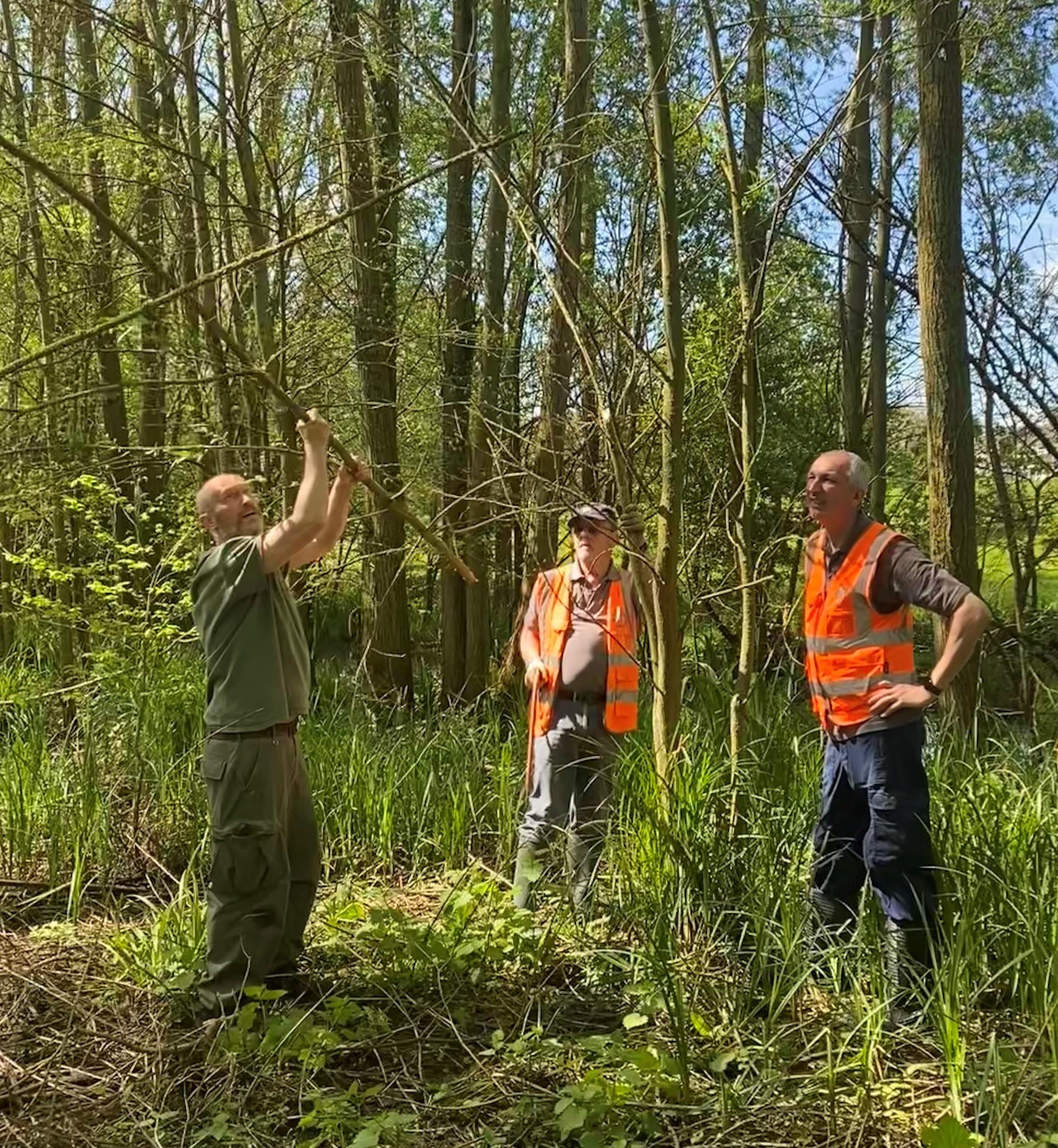Community
See how local community groups are tackling climate change.
Want to know more about tackling climate change in our district? Sign up for our Environment E-newsletter
St Michael’s Church
St Michael’s Church in Braintree has been recognised for its climate friendly initiatives with a Bronze Eco Award from Christian environmental charity, A Rocha UK.
Members of the Eco Church Group and stewards of the church gardens, Jonathan and Estelle Wicks, explained why St Michael’s decided to go green.
Incredible Edible Earls Colne has gone from strength to strength since. The group now have permission from Eastlight Community Homes to create another garden in the village.
“As a church we realised that caring for creation had to be part of the Christian mission, so we signed up for the award. Estelle and I had recently retired and were looking for a project, so we offered to take on the garden”, explains Jonathan.
The green fingered pair got to work just two years ago and the garden is already bustling with life. Together they reduced the widespread cow parsley and green alkanet, replacing this with seeds donated by the Essex Wildlife Trust. In its place now are ox eye daisies, teasel, flax, poppies, red and white campion, corncockle and wild chicory – and lots of others grown from Essex Wildlife’s seeds that they haven’t identified yet!
Estelle explains: “Some insects love cow parsley and green alkanet, but you need to attract all kinds. Last year we had an explosion of ladybirds. As we were working so closely with the garden, we got to see their whole life cycle, which was really lovely.”
Embracing the spirit of reuse, Jonathan and Estelle gathered all the builders’ rubble from the soil and larger prunings and used them to create insect homes. Bird and hedgehog boxes are dotted about the garden and compost systems quietly work away, providing nourishment for the plants. Rainwater is also harvested and reused.
All this experience was shared in an exhibition on making your garden eco-friendly last November in George Yard and Braintree Library – you can see two of the images below.
Being an Eco Church is about more than the natural environment; energy efficiency measures have also contributed to St Michael’s success – and lower energy bills! Double glazing and low energy or LED lighting have been installed in the hall, and solar panels on the roof. Cycle racks and lift-sharing help to reduce car use.
As everyone tending the vine knows, the work is never finished. Next on the agenda? Roof insulation in the hall – and Silver Eco Church status!

Maurice Bacon, President of Braintree Beekeepers
Bees are so important to humans – they pollinate crops, which feed us and the livestock that we eat, and are a vital link in the food chain. Buying honey from small suppliers supports local business and is a contribution to your community’s ecosystem!
We met Maurice Bacon, President of Braintree Beekeepers, and local honey supplier for a Q and A about our fuzzy friends.
How did you get involved in beekeeping?
Through my father. He kept bees and I helped him look after them, from before I even went to school. He learned from his father - my family has been keeping bees here since about 1880. But bees have been around even longer! About 30 million years.
Have you passed it down to your children?
No - they’re not interested at all! But my great grandchild has shown a bit of interest recently, so maybe there’s hope there.
What’s your favourite thing about beekeeping?
I’ve always found them fascinating. I can spend a whole day with them and not notice the time. And I’m always learning more. I don’t know half of what the older generations did, and the thing about bees is that they’re always up to something that’s not in the books!
What changes have you seen?
So much change. Nicotinoid pesticide sprays are the biggest problem beekeepers have faced. They don’t only affect bees, they kill lots of other insects.
On the more positive side, there’s been a big increase in beekeeping. The Braintree Beekeepers’ Association had 30 members a few years ago; now we have 150! People are getting more concerned about climate change and biodiversity.
How do you support new beekeepers?
We offer a year’s mentoring to beginners and I’ve got two at the moment. I help them get their hives sorted, it’s mostly practical support. I do get panicked phone calls sometimes when they don’t know what’s gone wrong!
How many hives do you have?
I’ve got 20. I keep a few in the spinney near my house but the rest are on farmers’ land. The bees help the farmers with pollination and I get to use their land. They’re so important to our crops - if bees die out, the human race is in trouble.
What should people do if they see a swarm?
They will move along on their own, but really the best thing to do is call someone in because sooner or later they’ll end up where someone doesn’t want them, like a cavity wall or chimney. If they’re a nuisance, I’ll happily come and collect them.
Where can people spot your honey for sale?
I’ve been selling my honey in Braintree Museum since the 1990s, and from the butchers in Witham. You can buy it from my house too. It’s called Shirlmo Apiaries – a mix of Maurice and my wife’s name, Shirley.

Friends of Hoppit Mead
Running alongside the River Brain, the reserve links London Road to Notley Road with a stretch of woodland, grass and fertile riverbank. The wet woodland by Hoppit Bridge is the oldest example of its kind in all of Essex. Birds, bees, butterflies, dragonflies and all kinds of other wildlife make their home here.
Taking care of this precious slice of nature in the centre of town is the Friends of Hoppit Mead, led by Denise Perrin. The small, friendly group of volunteers meets for a few hours on the first Saturday of every month in Marshalls Park car park.
Together they test the river water by dipping and recording the variety of weird and wonderful bugs that are living there. They also keep an eye on the other wildlife, litter pick, plant trees and even get creative, weaving willow to make living structures for people to enjoy.
The meets are a great way to spend a couple of hours – fresh air, sunshine (if you’re lucky) and good company. If you want to get involved, the group welcomes people of any age (children must be accompanied by an adult) to offer as much or as little time as you like.
Interested to know more? Email Denise Perrin at macperrin21@gmail.com

Hatfield Peverel Wildlife Champions
On a rare sunny morning in February, we joined the Hatfield Peverel Wildlife Champions as they planted some native whips along the border of the Recreation Ground. The whips were donated by the Essex Forest Initiative, who have also recently given the volunteers some tree-planting training. They included hawthorn, dog rose and blackthorn and, once established, will provide shelter and food for animals and insects...


Eco Colnes and Halstead
Cherry began her eco-journey by starting to make small changes around her home.
She took steps by doing simple things like turning the tap off whilst brushing her teeth and switching lights off when not in the room. She made sure to check if her waste was recyclable and took the plugs out of sockets when not charging her phone.
But for Cherry that wasn’t enough. Cherry has decided to open a refill shop this December. Cherry has brought together a local community group of over 1,200 members sharing ideas and tips on what else we can do to help save our planet.
As a member of Braintree District Council’s Climate Change Working Group, Cherry represents a local community voice.
Join in the conversation with Eco colnes and Halstead community group:
Incredible Edible
Incredible Edible began with two women in Todmorden. It has now branched out into an international network of Community Gardens. They grow vegetables, herbs, fruit and flowers for the benefit of local people, wildlife and the environment.
Volunteers in Earls Colne started the Incredible Edible project in the first lockdown. They worked to create a garden on the High Street from an unused plot of land. A Councillor Community grant of £500 allowed them to buy compost, tools and seeds to progress the project.
Incredible Edible Earls Colne has gone from strength to strength since. The group now have permission from Eastlight Community Homes to create another garden in the village.
Jayne Meleschko, one of the leaders of the project, said "Our scheme is part of a much wider national Incredible Edible movement. While encouraging the growing of fruit and veg in community spaces, we promote education in schools and local groups.
“I would encourage anyone who is interested in starting something similar in their locality to ‘go for it’
A starter guide is available on the Incredible Edible website

Repair Cafe
Repair Café at Cornerstone Church, Black Notley takes place on the third Saturday of every month, 10:00am – 12:00pm.
Members of the wider community can bring items in need of repair for example clothes, electricals, and bikes. A dedicated team of fixers will try their utmost to knock things back into shape. This is all for free, although donations for materials are welcome.
Not only can repairing save you money, but it also reduces waste and saves items from going into landfills. A great way to help tackle climate change and save our planet.
For more information, you can email
Matt Ager matt@mattnvicki.co.uk
Green Heart Champions really do care about our environment
A big thank you to all our Green Heart Champion volunteers for their unwavering support in helping to keep our district clean and tidy. Residents of all ages from across our district spend a little bit of time now and then, or help out on a regular basis.
Grace and Jamie have been litter picking the Rivenhall Park estate in Witham for the past few years. Grace and Jamie said they like to litter pick to help the animals and the environment and hate to see litter spoiling their local area.
Logan and Summer are keen litter pickers in Braintree and after seeing others wearing Green Heart Champion high-vis jackets, they enquired about joining the scheme. They regularly share their efforts to inspire others via our dedicated Facebook group.
Find out more about becoming a Green Heart Champion:
Visit: www.braintree.gov.uk/greenheart
Email: greenheartchampions@braintree.gov.uk
Call our Customer Service Centre: 01376 552525



How are you saving the planet?
Tell us what steps you have been taking to be kinder to the environment
Tell us how you are saving the planet